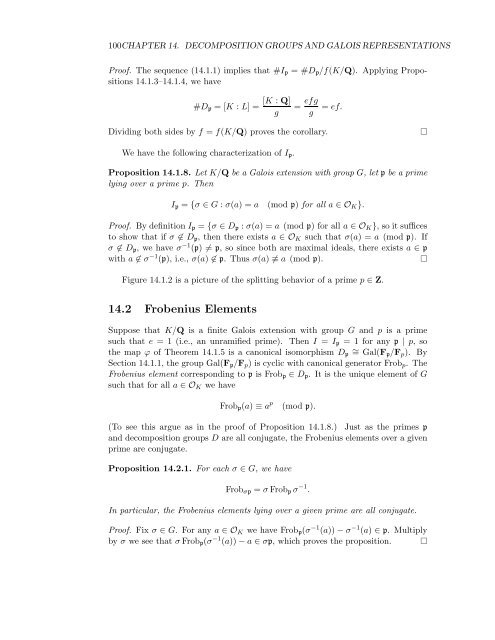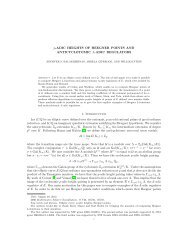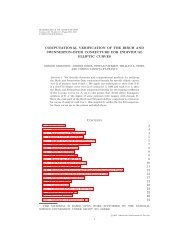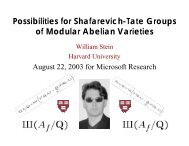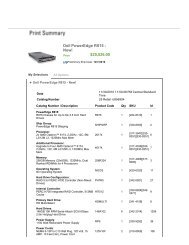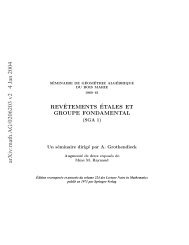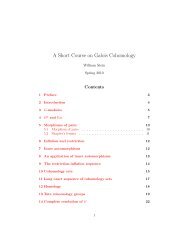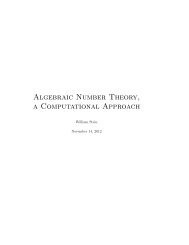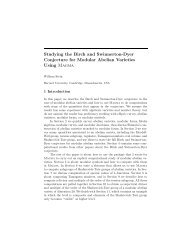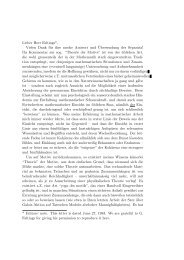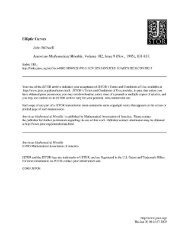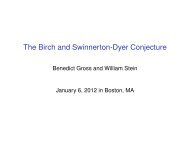A Brief Introduction to Classical and Adelic Algebraic ... - William Stein
A Brief Introduction to Classical and Adelic Algebraic ... - William Stein
A Brief Introduction to Classical and Adelic Algebraic ... - William Stein
Create successful ePaper yourself
Turn your PDF publications into a flip-book with our unique Google optimized e-Paper software.
100CHAPTER 14. DECOMPOSITION GROUPS AND GALOIS REPRESENTATIONS<br />
Proof. The sequence (14.1.1) implies that #Ip = #Dp/f(K/Q). Applying Propositions<br />
14.1.3–14.1.4, we have<br />
#Dp = [K : L] =<br />
[K : Q]<br />
g<br />
= efg<br />
g<br />
Dividing both sides by f = f(K/Q) proves the corollary.<br />
We have the following characterization of Ip.<br />
= ef.<br />
Proposition 14.1.8. Let K/Q be a Galois extension with group G, let p be a prime<br />
lying over a prime p. Then<br />
Ip = {σ ∈ G : σ(a) = a (mod p) for all a ∈ OK}.<br />
Proof. By definition Ip = {σ ∈ Dp : σ(a) = a (mod p) for all a ∈ OK}, so it suffices<br />
<strong>to</strong> show that if σ ∈ Dp, then there exists a ∈ OK such that σ(a) = a (mod p). If<br />
σ ∈ Dp, we have σ −1 (p) = p, so since both are maximal ideals, there exists a ∈ p<br />
with a ∈ σ −1 (p), i.e., σ(a) ∈ p. Thus σ(a) ≡ a (mod p).<br />
Figure 14.1.2 is a picture of the splitting behavior of a prime p ∈ Z.<br />
14.2 Frobenius Elements<br />
Suppose that K/Q is a finite Galois extension with group G <strong>and</strong> p is a prime<br />
such that e = 1 (i.e., an unramified prime). Then I = Ip = 1 for any p | p, so<br />
the map ϕ of Theorem 14.1.5 is a canonical isomorphism Dp ∼ = Gal(Fp/Fp). By<br />
Section 14.1.1, the group Gal(Fp/Fp) is cyclic with canonical genera<strong>to</strong>r Frobp. The<br />
Frobenius element corresponding <strong>to</strong> p is Frobp ∈ Dp. It is the unique element of G<br />
such that for all a ∈ OK we have<br />
Frobp(a) ≡ a p<br />
(mod p).<br />
(To see this argue as in the proof of Proposition 14.1.8.) Just as the primes p<br />
<strong>and</strong> decomposition groups D are all conjugate, the Frobenius elements over a given<br />
prime are conjugate.<br />
Proposition 14.2.1. For each σ ∈ G, we have<br />
Frobσp = σ Frobpσ −1 .<br />
In particular, the Frobenius elements lying over a given prime are all conjugate.<br />
Proof. Fix σ ∈ G. For any a ∈ OK we have Frobp(σ −1 (a)) − σ −1 (a) ∈ p. Multiply<br />
by σ we see that σ Frobp(σ −1 (a)) − a ∈ σp, which proves the proposition.


